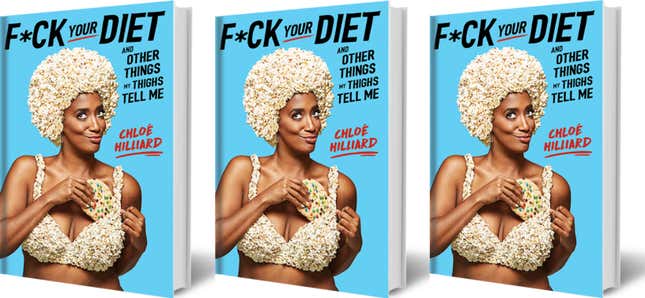
Chloe Hilliard is hilarious. No, really; the veteran journalist-turned-standup comedian was a semifinalist on NBC’s Last Comic Standing, has since appeared on Comedy Central and The Tonight Show Starring Jimmy Fallon, and even hosts her own podcast, Social Misfit with Chloé Hilliard. And when you see her perform live, as I did in January at Chicago’s legendary Zanies Comedy Club, you can’t help but wish she was one of your homegirls.
“Smart, inspiring and hilarious. Chloé lets it all hang out. We should too,” reads a quote from Wanda Sykes on the book’s dust cover.
Part of it is her relatability; though now standing over 6-feet-tall, Hilliard was a size 12 at age 12—and honestly, so was I. So, when I had the chance to speak with her about her first book, F*ck Your Diet: And Other Things My Thighs Tell Me, I jumped at the chance, because God bless those of us born with “big bones”...with equally big butts to match.
While the title of her first tome may be funny, what Hilliard shares within its pages is real talk, research and analysis about the “obesity epidemic” and the people it affects, spurred on by Hilliard’s own self-critical (and at one point, self-abusive) quest to lose weight.
“What changed my life was the realization that my issue with weight wasn’t entirely my fault,” she says in F*ck Your Diet. “You’re only as healthy as your options and, for me, those options were determined by socioeconomics, culture, ill-informed, deep-rooted traditions, and my zip code.”
Coming to the decision to write a book about her journey was only slightly less comical than Hilliard herself. “You know, I met with my book agent, and he said, like, real nonchalant-like, ‘You know, the bestselling books are diet books,’” she recalls. “And you know, my comedic mind, I was like, ‘I should just say ‘fuck your diet,’ and he was like, ‘Yeah, perfect.’”
But instead of continuing on the comedic path, Hilliard sought to make sense of an often nonsensical system that simply tells us fat is bad while pumping us full of the exact things that makes us so.
“What I did was I just pulled from my own life experiences as a fat kid growing up in my insecurities and body issues, and how that manifested into intra-personal relationships—whether it’s intimate or professional—and how the world views me as a big, black woman,” she recounts. “And then, I wanted to include facts and figures, as a journalist, to kind of drive that point home.”
“And I think the main takeaway that I want to receive from this book is like, yes, you have control over your life; but there’s also a lot of things that we don’t have control over when it comes to food and diet in America,” Hilliard continues. “And if you’re still trying to lose that last 20 pounds, you may be working against yourself, because of socioeconomics, food that you have access to, the chemicals...there’s a lot of things that we don’t really take into consideration when we say, ‘Oh, you should just lose 10 pounds.’”
Hilliard currently (and successfully) eats for her blood type but has tried “everything”—which makes her the first to admit that everything isn’t for everyone.
“It got to the point where, as a kid, that I would hide my eating because I didn’t want people to be critical—even if I was hungry and it was time for me to eat...so, I was always cognizant, especially as a kid in social environments, it’s like, ‘I can’t let them see me eat, because they’re going to judge me, even though I’m starving; because I’m bigger. And so, that became a thing I was always conscious of—and it turned into an eating disorder.’”
Whew, the empathy is strong with this one. Full disclosure: In my teens to mid-20s, I developed an eating disorder, as well—in fact, the same one as Hilliard; a binge-eating disorder largely carried out in secret.
In explaining how her own disorder developed, Hilliard draws on her own upbringing to draw correlations between anxiety around eating and economic anxiety. “I think we feel a different pressure on eating in our family dynamics because we value food like it’s currency,” she says.
If it sounds like heavy lifting for a book with a popcorn bra and afro on its cover, perhaps it is—but the hypocrisy (and occasional absurdity) around weight and eating in our society is equally so. And in keeping with that irony, it’s exactly what Hilliard is trying to highlight; if just to let us know it’s not all our fault.
“I know aesthetically how it looks when you see the cover: ‘Oh, this is going to be fun and lighthearted,’” she says. “[B]ut I really want people to know that it’s like a well-thought-out and relatable experience...I think the solution is to let yourself live; to just embrace who you are—and I’m not saying to be unhealthy; that’s definitely not the message...[but] I also hope we stop looking at health as a luxury.”
I agree; maybe we should just look at it as a form of self-love.
Happy Valentine’s Day.



